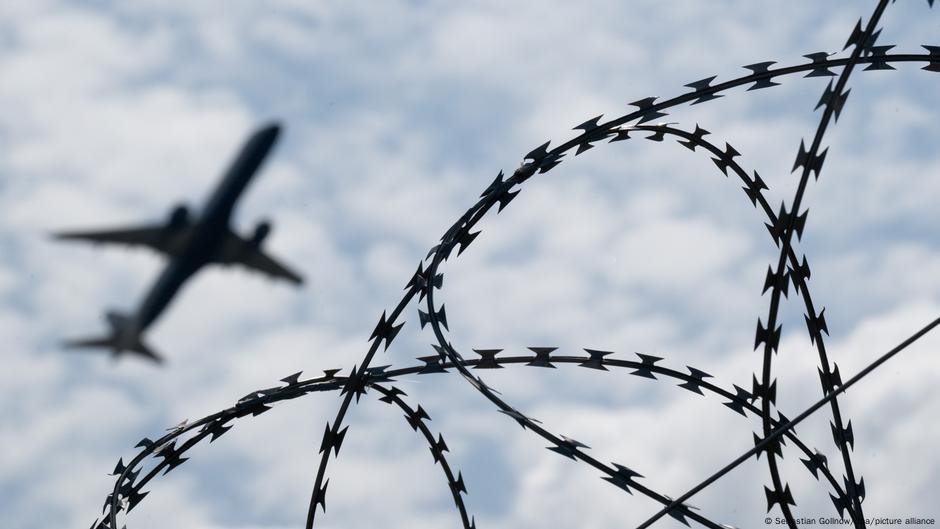As Germany ramps up deportations, Yemeni refugees face dwindling asylum approvals despite fleeing one of the world's worst humanitarian crises. Some have traveled to Calais hoping to cross the Channel to the UK.
Germany has significantly increased deportations in recent months, driven by mounting political pressure on its now-collapsed coalition government. This trend is expected to further intensify following elections scheduled for February next year.
For a few categories of people, convicted criminals for instance, and only via indirect routes, Germany has even begun to return some people to Afghanistan, although it is not classified as a "safe country" for everyone to be returned to.
Yemen is a country embroiled in one of the world’s worst humanitarian crises, according to the UN. The German Foreign Ministry has issued a travel warning for Yemen, urging all German nationals still in the country to leave immediately. The risks include ongoing terrorist attacks by Al-Qaeda and ISIS, threats of kidnapping, and a lack of government control over large parts of the country. The numbers of Yemenis actually seeking asylum in Germany is still relatively low. Nationals from Yemen do not figure in the top ten list of nationals from countries seeking asylum in Germany.
According to data from the German parliament, in 2023, just over 1,000 people sought asylum from Yemen in Germany. In the first two months of 2024, that number was just 235. What is interesting though is that since 2015, the protection rate for those asylum seekers has sunk significantly, from 100 percent in 2015 to 51.9 percent by the first two months of 2024.
This is despite the fact that since 2014, Yemen has been devastated by a civil war between the Houthi rebel movement and a Saudi-led coalition supporting government forces, resulting in mass displacement, famine, and a near-total collapse of infrastructure. For many Yemeni asylum seekers, returning home is not an option, many have said that they face violence, persecution, and in some cases, death if they did so.

In the neighboring Netherlands, according to the European Council on Refugees and Exiles (ECRE), and the Dutch refugee council, there were fewer than 2,000 asylum decisions on Yemeni nationals in 2023. Of those applications, 15 were rejected, 35 received refugee protection, and 1,675 received a form of subsidiary protection. 20 were given humanitarian protection. The acceptance rate is fairly high there, at 99.1 percent, but for those who do receive a rejection in countries like Germany or the Netherlands, traveling to Calais and hoping to reach the UK can be the next option.
Post-Brexit, the UK is no longer part of the Dublin Regulation, a law that requires asylum seekers to be sent back to their first point of entry in the EU. Without this framework, migrants whose claims were rejected in EU countries like Germany now seek to restart the process in the UK, which no longer shares reciprocal asylum agreements with the EU.
Among them are individuals like Ali*, an 18-year-old who fled Germany after receiving a deportation order. InfoMigrants spoke with Ali alongside two other Yemeni men who had been living in Bavaria before arriving in Calais a few weeks ago. They now hope to restart their asylum process in the UK, that is, if they are able to cross successfully.
Read AlsoInside a detention center for rejected asylum seekers
Stories of survival and despair
Ali arrived in Bavaria at 16 as an unaccompanied minor. Living with a German family, he attended school and speaks both English and German. However, he says shortly after he turned 18, his asylum application was rejected.
He appealed, presenting evidence of extreme abuse in Yemen at the hands of his father and uncle, who had tried to coerce him into fighting in the war. He even showed scars from bullet wounds inflicted by his father. "I have these scars all over my body," he said, pointing to a deep scar on his hand. "But when I presented this to the judge, he still rejected my claim."
Domestic violence or conflict, is rarely accepted as grounds for asylum in most countries. However, Ali appears defeated.
"I came to Germany as a child, I went to school, I learnt the language, I got an apprenticeship I don’t know what else I was supposed to do.”
Just days after his appeal was denied, Ali traveled to Calais, where he has been for over two weeks. "There are many people looking for me in Yemen. My father wants me dead. If I had even just a 5 percent chance of security in my country, I'd go back immediately."

He says in the UK he dreams of doing an apprenticeship, going to school, living a normal life. I just want to be like other boys, he confides. "I don’t know what else to say," he says, tears start rolling down his cheeks.
When asked about the dangers of crossing the Channel, Ali admitted his fears:
"Yes, I'm scared. But what can I do? I can't stay here. I'm scared everywhere, I'm scared here and also in the sea. But if I die, no problem."
Another man, in his late 20s who had also recently left Bavaria following a deportation order, shared his frustration, showing InfoMigrants his papers. "They took my passport and were trying to send me back, so I left Germany and came here," he says.
The third man in his 30s, told InfoMigrants he didn't like how he was treated in Germany, recalling racism from the local population. Despite submitting five employment contracts to German authorities – a typical requirement for staying in the country – he was still issued a deportation order.
"There is a war in my country. All I want is to be safe," he said. He, too, came to Calais, hoping to seek asylum in the UK.
Read Also'Where's the humanity?' – the story of one Yemeni migrant's journey to Europe
Systemic failures and bureaucratic barriers
On September 14, 2024, approximately 600 Yemeni migrants protested in Munich against the asylum decisions issued by the BAMF (Germany’s Federal Office for Migration and Refugees). They demanded fair hearings and recognition of their reasons for fleeing. Around half of asylum applications from Yemeni nationals in Germany are currently being rejected.
The protesters highlighted Yemen’s dire circumstances: the ongoing civil war, severe water shortages, natural disasters, and widespread poverty. Since 2015, more than 4.5 million people have been displaced, with 70 percent of the population dependent on humanitarian aid and half facing food insecurity. Despite this, approval rates for Yemeni asylum seekers have dropped by 20 percent since 2022. Currently around 3,835 Yemenis reside in Bavaria, of whom 1,430 are currently in ongoing asylum proceedings.
Murad, one of the speakers, voiced the collective desperation:
"We ask for a chance to live away from the noise of bullets and the smell of blood, an opportunity to live in peace and to make a positive contribution to the communities where we have sought refuge."

Zahra, another protester, highlighted the unique challenges faced by Yemeni women:
"I am speaking today on behalf of all Yemeni women in Germany. These women left Yemen not only because of war, displacement, and hunger but also due to rape and the forced marriage of minors. Some girls, when forced into marriage, would rather take their own lives."
She added: "The rejection Yemeni women face here in Germany leaves them anxious, nervous, and unable to adapt."
Human rights activists and refugee associations have also cited systemic issues, such as inadequate interpreters and poorly prepared hearings, as factors contributing to high rejection rates. Many, like Ali, cannot afford legal representation, further hindering their ability to present strong cases.
Stephan Dünnwald from the Bavarian Council for Refugees tells InfoMigrants:
"The current politically charged climate in Germany is pushing for deportations at any cost. And the authorities are leaning into this climate."
Read AlsoDeportation pressure undermines refugee job integration, warns Bavarian Refugee Council
Broader implications
The consequences of these deportations extend beyond individual lives, Dünnwald also highlights their economic impact.
"There is no consideration for businesses. The deportation of people in employment or training/education is hugely damaging to the economic health of Bavaria."
Under different circumstances, many of these individuals could have pursued apprenticeships or other paths to integration. However, Germany’s increasingly politicized stance on migration has led to a surge in deportations. This trend affects not only Yemenis but also migrants from Iraq (including Yazidis), Afghanistan, and Syria.

For those stranded in Calais, the choice is stark, risk a dangerous Channel crossing or face the dangers at home.
The plight of Yemeni migrants like Ali underscores the consequences of the current European migration policies. As deportations rise, individuals fleeing violence are left in limbo, forced to navigate life-threatening journeys in search of safety and dignity.
Read AlsoNew EU migration policies expected to get even tougher in 2025
*Name changed to protect their identity
